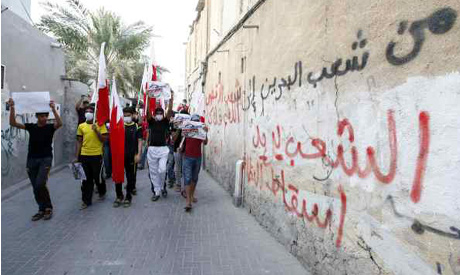
Anti-government protesters march on streets in village of Sanabis, west of Manama, 11 February (Photo: Reuters)
Bahrain's opposition groups, expecting little from a renewed national dialogue, plan to stage protests this week to mark the second anniversary of a Shiite-led uprising that was crushed by security forces.
The February 14 Revolution Youth Coalition, a clandestine cyber group and Al-Wefaq, the main Shiite opposition, have called separate protests, which the authorities say are attempts to put pressure on the dialogue called by King Hamad.
Bahrain has been caught in a political deadlock since the mid-March 2011 protests were crushed by security forces.
The February 14 Revolution Youth Coalition has called for a march to what was once known as the Pearl Square where demonstrators had camped for a month before being forcefully driven out in mid-March 2011.
The square itself no longer exists as authorities in the Gulf kingdom which is ruled by the Sunni Al-Khalifa dynasty razed it, indicating its determination in crushing the revolt at a time when Arab Spring protests were toppling long powerful dictators in the region.
The coalition has urged sympathisers to go on strike and take to the streets and squares on Thursday and march to the site of the former Pearl Square on Friday.
For its part Al-Wefaq has called for a major rally on Friday outside of Manama.
Bahrain's authorities are bracing for street escalations.
"Unfortunately, we do expect escalations in the street. This has been said openly," Bahrain government spokeswoman Samira Rajab told AFP.
She said the protests were planned to "put pressure on the dialogue" which began Sunday in a desert resort.
The separate protests show a deepening difference in the approaches of the traditional opposition which calls for democratic changes and the hardliners who resort to burning tyres and hurling petrol bombs at police during protests demanding a regime change.
"There are many people who think that the regime is not serious about the dialogue. We partly share the same feeling," said Al-Wefaq's chief cleric Ali Salman.
"They are frustrated about the dialogue and the government approach. That is why they go to the extreme and demand to topple the regime," he told AFP of hardliners, claiming that the government has "not even made a single goodwill gesture".
"Arrests and trials continue, so does the clampdown on freedoms."
But Rajab, a Shiite herself, charged that the opposition was a Shiite "sectarian movement" and said it would be "superficial" to describe Bahrain's uprising as a "revolution and that there are people calling for reforms".
The 2011 uprising led to Bahrain's Sunni Gulf neighbours who are traditionally wary of the influence of Shiite-Iran to send troops led by Saudi Arabia into the island kingdom to back Bahrain in quelling the protests.
The heavy-handed crackdown was followed by a wave of arrests and martial trials that targeted hundreds of opposition leaders and activists.
The International Federation for Human Rights says that 80 people were killed in Bahrain's unrest since demonstrations erupted on 14 February, 2011.
Cleric Salman reiterated that the opposition does not aim to topple the monarchy, insisting on his bloc's demands for a proper constitutional monarchy, with an elected prime minister to replace the king's uncle Prince Khalifa bin Salman, who has been in office for four decades.
Bahrain has an elected parliament in which Al-Wefaq formed the largest single bloc in two polls, before its MPs walked out in protest to violence against demonstrators in February 2011.
But the parliament has an upper chamber appointed by the king.
The Shiites also demand a redrawing of the electoral constituencies which they claim eat into their fair share of seats in the parliament, as well as access to employment in security forces.
The opposition made a last-minute decision to take part in the national dialogue on Sunday, joining ministers and members of pro-government Sunni political groups.
The opposition had welcomed the talks but also said an agreement on the mechanism of the planned talks should be agreed in advance and the results be put to a referendum rather than be submitted to King Hamad for approval.
Opposition groups had walked out of the first round of talks in July 2011.
Short link: